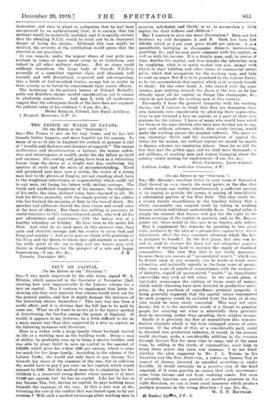LEVY ON CAPITAL.
[To THE EDITOR OF THE " SPECTATOR."] SIIA,—I was much impressed by the able letter signed W. A. Briscoe, which appeared in the Spectator of November 22nd, showing how very impracticable is the Labour scheme for a levy on capital. May I venture to supplement that letter by showing also how very unjustly that scheme would work out for the general public, and how it might damage the interests of the labouring classes themselves ? This late war has been a costly affair, and it is obvious that the bill has to be paid by some one. What we all want to arrive at is the fairest method of distributing the burden among the people of England. It would, it appears to me, however, be a little difficult to hit on a more unjust way than that suggested by a levy on capital, as the following instances will illustrate.
Here is a widow with a large family whose husband started in life as a working man in the building trade. Being a man of ability, he gradually rose up to being a master builder, and was able by great thrift to save up capital to the amount of £10,000, which gives his widow £500 per annum, which is none too much for her large family. According to the scheme of the Labour Party, she would not only have to pay Income Tax towards her share of the expenses of the war, but in addition she would have to pay 3 per cent. on her capital, which would amount to £300. But the medical man she is employing for her children is a successful young doctor whose income is at least £2,000 per annum, but helms no capital. Like her he has to pay Income Tax, hut, having no capital, he pays nothing more towards the expenses of the war. Is this a fair way of dis- tributing the cost of the conflict that was forced upon us by our enemies f Will such a method encourage other working men to
exercise self-denial and thrift, so as to accumulate a little' capital for their widows and children ?
May I venture to give one more illustration P Here are two brothers we will designate A and B. Each has been left £20,000, which at 5 per cent. gives £1,000 per annum. A is a spendthrift, indulging in champagne dinners, horse-racing, gambling, &c., and he soon parts company with his capital, as well as with his income. B is a thrifty man, and, in course of time, doubles his capital, and thus benefits the labouring man by supplying, what is so much needed just now, money with which to start building and other forms of commercial enter- prise, which find occupation for the working man, and help to send up wages. But B is to be penalized by the Labour Party, as he has accumulated that capital which is of so much benefit to them! On the other hand, A, who started with the same income, pays nothing towards his share of the war, as he has already spent all his capital on things like champagne, &c., which do not benefit the working men of this country.
Personally I have the greatest sympathy with the working classes, but I venture to think that they are damaging their own interests very considerably by allowing their representa- tives to put forward a levy on capital, as a part of their pro- gramme for the future. I know of many who would have voted for them at the next election who have now decided not to sup- port such wild-cat schemes, which, they wisely foresee, would make the working classes the greatest sufferers. The more we can encourage thrift and the accumulation of capital the better for the nation, for without capital we should he unable to finance schemes for employing labour. Once let us kill the lien that lays the golden eggs, and we shall have thousands, if not millions, of working men and women tramping about the country vainly seeking for employment.—I am, Sir, &c.,
SETON CHURCHILL, Lieut.-Colonel.
Colliton Lodge, Wimbledon Common, S.W.






































 Previous page
Previous page